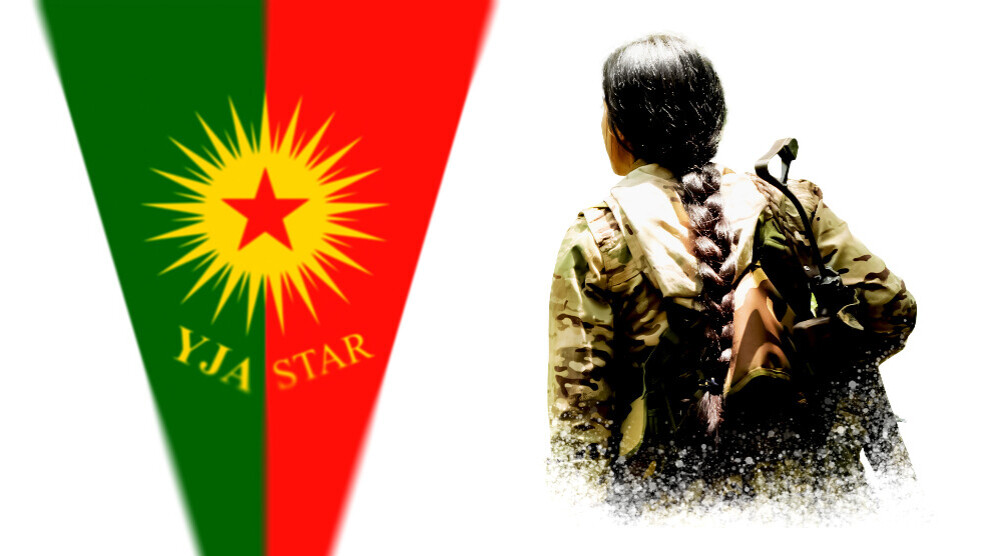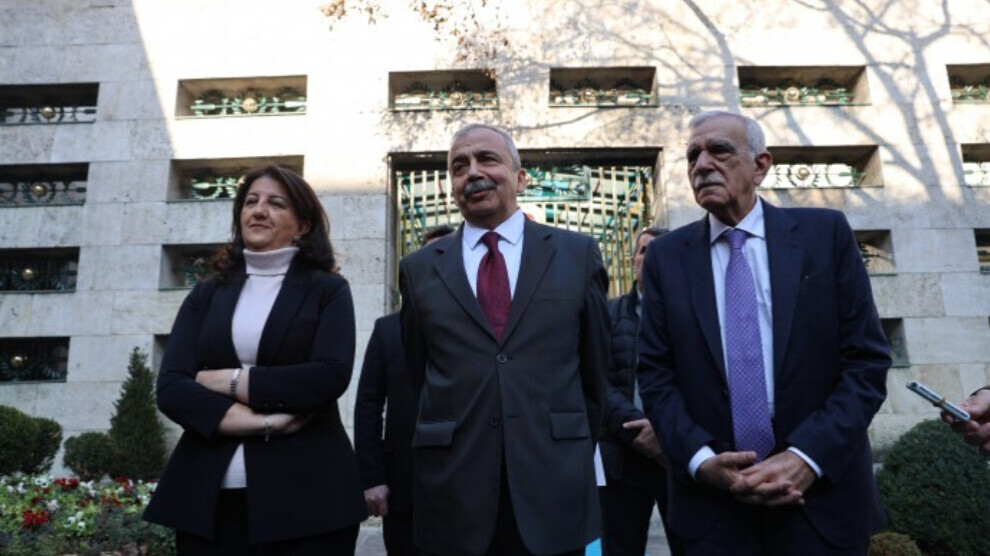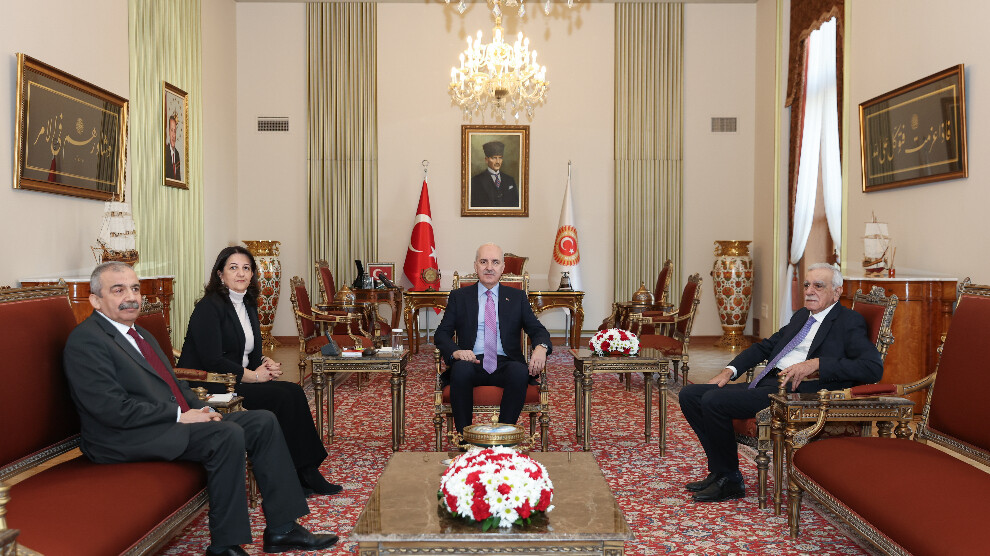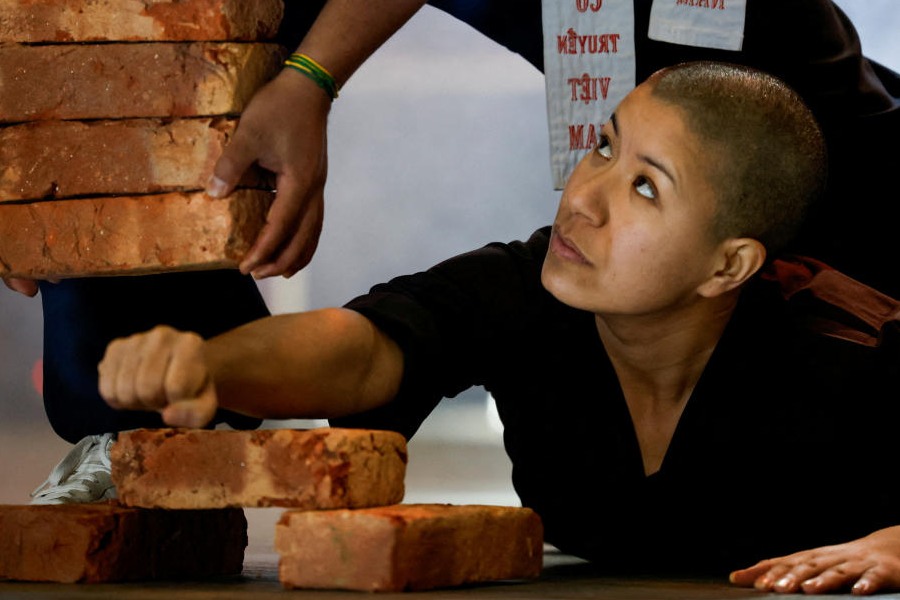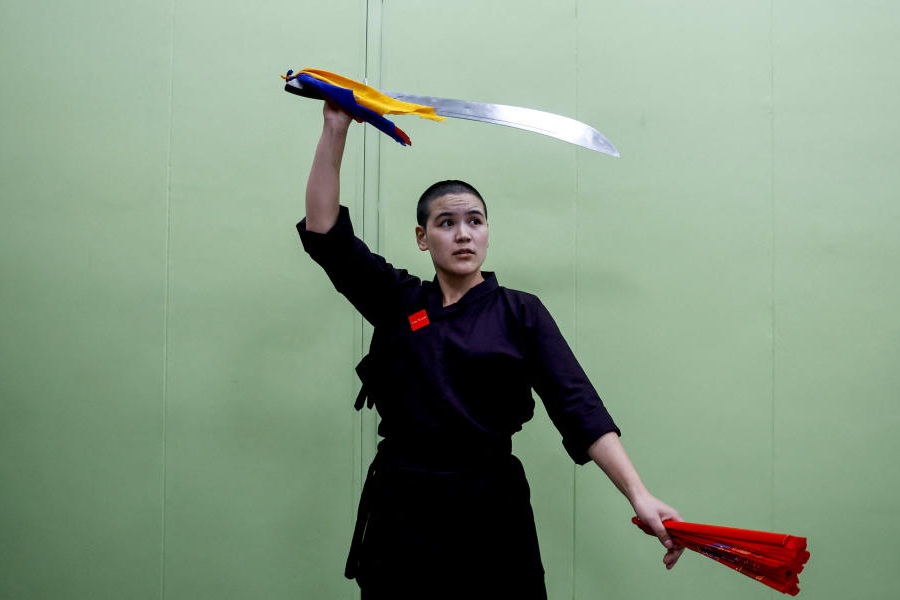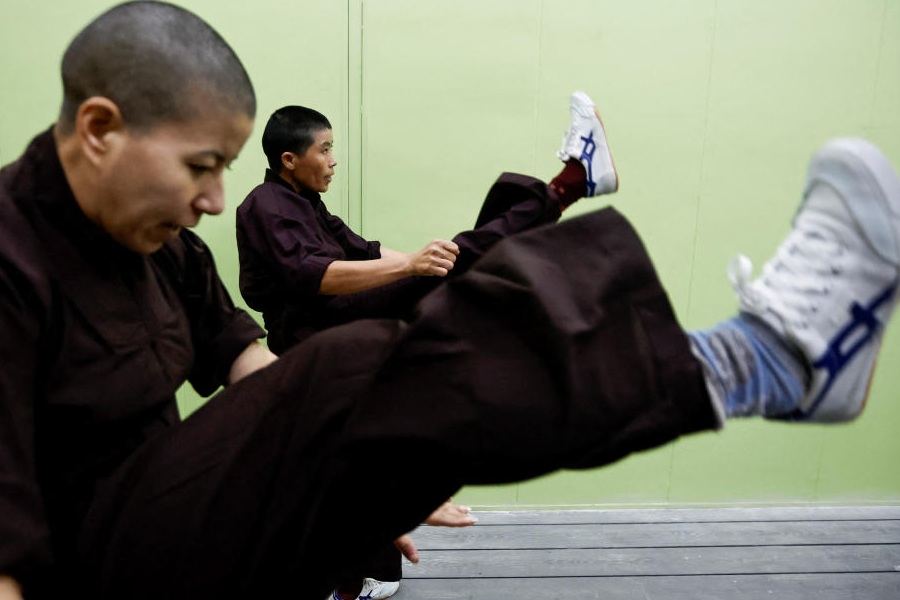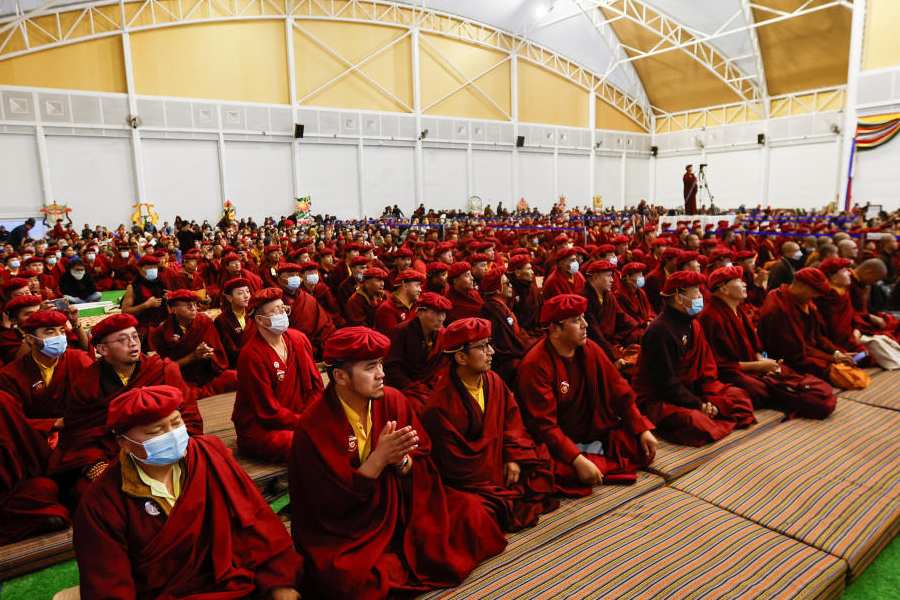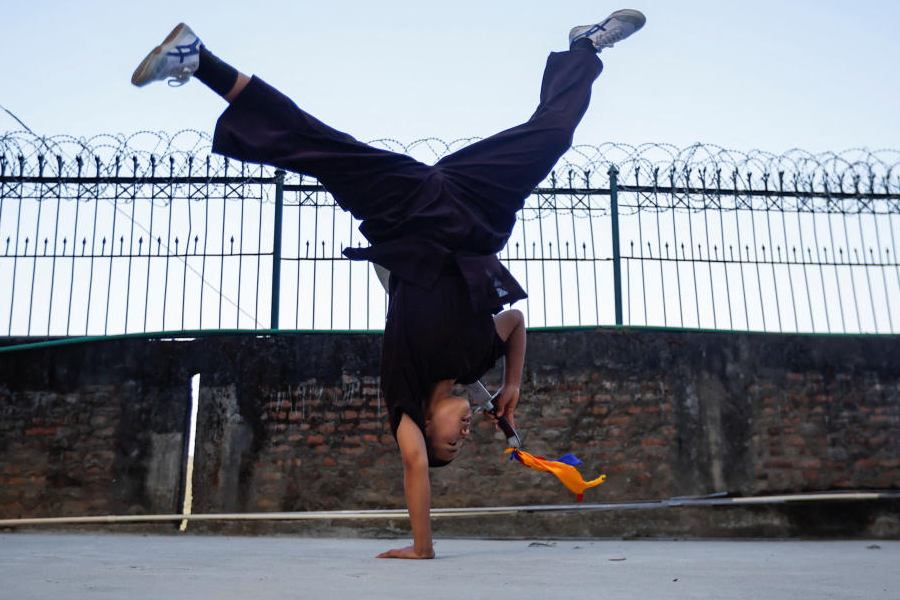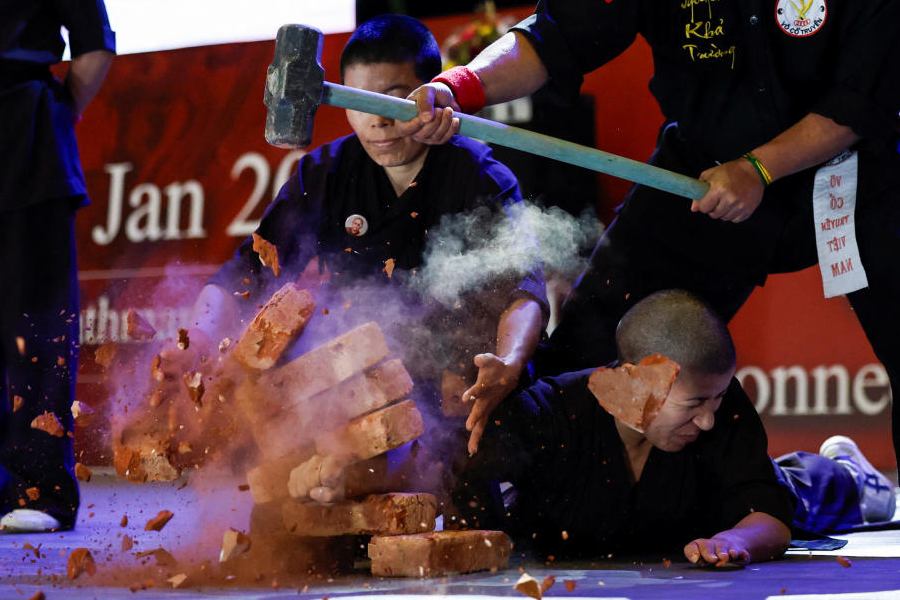Besê Hozat said that "The Third World War is raging and has reached a decisive stage. The region is being redesigned, and in this redesign, Israel is being tried to be turned into the primary hegemonic power of the region."
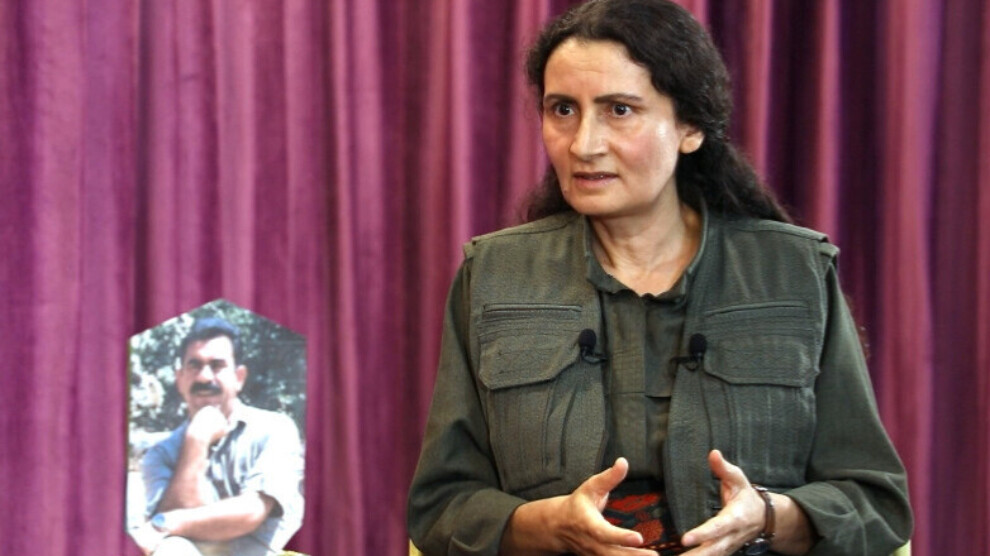
ANF
NEWS DESK
Thursday, 2 January 2025, 07:50
In the second part of this in-depth interview, Besê Hozat, co-chair of the KCK Executive Council, analyzed the current redesign of the region through war, which also threatens to spill over into Iraq.
The first part of this interview can be read here.
In the Middle East, the center of the Third World War, the war continues with full intensity. In Syria, the Baathist regime has fallen and HTS has been brought to power. What kind of plan is being implemented in Syria and what role do regional powers such as Turkey and Iran play in it?
The Third World War is raging and has reached a decisive stage. The region is being redesigned, and in this redesign, Israel is being tried to be turned into the primary hegemonic power of the region. In fact, the Greater Middle East Project itself is such a project, in which a new shape is given to the region on the basis of Israel’s interests. Ethnic, sectarian, and religious conflicts are used as a fundamental weapon in the implementation of this project. The war in Gaza, the war in Lebanon, the war that is currently intensifying in Syria, the collapse of the regime, the seizure of power by HTS in Damascus, the gradual spread of the war to Iraq, the intensification of the war in Iran, which is the main target, and Turkey becoming a center where the war is intensifying, this whole process is a redesign process for the region.
This is the general framework within which it is necessary to evaluate the developments. One needs to see and foresee the consequences for the peoples and must decide on how to struggle accordingly. HTS came to power in less than two weeks. It overthrew the more than 60-year-old Baath regime and seized power in Damascus. But this did, of course, not happen based only on HTS’s own power. This was an international plan that is being led by America, Britain, and Israel. And Turkey was also included in this plan. Turkey was given the lead in the implementation of this plan. Now they are drunk on the supposed feeling of victory. They act as if they have made a great conquest, as if they have conquered Syria, as if they have taken over everything, and have created a great area of dominance in the Middle East. There is such a mentality in the government, in the ruling media, and in their circles of power. But that is not the truth. The truth of the matter is that Turkey has become like a donkey being driven into a minefield. This is the essence of Turkey’s situation.
A plan was made, and Turkey was given a role in the implementation of this plan. But looking at it, one will realize that a conspiracy was hatched against Turkey. By using Turkey, they broke Iran’s influence in Syria. Iran suffered a serious blow. They already did in Lebanon, as a heavy blow was dealt to Hezbollah. Now in Syria, Iran’s influence has been broken through Turkey. Turkey was very eager to fill the vacuum left by Iran and wants to fortify itself instead of Iran. It was only with this thought in mind that they were immediately ready to go along with the plan, without realizing what was really happening around them, without calculating, and without being aware of the depth of the plan and the consequences it would lead to. They were just focused on Iran’s neutralization and liquidation in Syria and on replacing it, turning Syria into a province, as it was during the Ottoman period. That is exactly what they are discussing intensely at the moment. A Syria under Turkey’s sovereignty will become an area that Turkey will utilize, exploit, and benefit from based on its interests. By establishing its hegemony over Syria, it will have established hegemony over the region to a large extent. For one hundred years, Iran and Turkey have been engaged in a great rivalry, a war for hegemony in the region, and now this is how they think they will succeed. By eliminating Iran’s influence and hegemony in the region, Turkey is trying to pave the way for shared hegemony in the region with Israel. It is now dreaming, longing, seeking, and striving for this.
But Turkey must know that they won’t allow it to swallow Syria. These ambitions of Turkey will be crushed. If it tries to swallow Syria, Turkey will suffocate on it. Israel will not share its hegemony in the region with Turkey. The international hegemonic powers have no interest in sharing the regional hegemony between Israel and Turkey. At the moment, a plan is being implemented to make Israel the main hegemonic power in the region, to put Turkey at its service, to break Iran’s hegemony in the region through Turkey, and then to break Turkey’s influence and put it at the service of Israel. At the moment, a deliberate perception is being developed in Turkey as if it has achieved a big victory. This is being developed deliberately. Trump’s praise for Erdoğan, calling him a “very clever, smart man”, is meant to develop this perception. As if Turkey really is a big winner in the region, a succeeding power. When Trump says this, he turns around, laughs, and mocks him. Israel turns around and mocks Turkey. Turkey is caught in a big trap. Now they are using Turkey, and when they are finished with them, they will relegate them to the place they have predestined for them. As soon as Turkey shows any resistance against this, they will stir up Turkey from within. They will intervene in Turkey with all means. This is how this government is trying to deceive society, the democratic forces, and the opposition. And the opposition has also fallen for it. It is trying to be a part of this and almost competes with the government. It will go to Damascus, offer municipal services, and improve relations. Instead of criticizing the government’s policies, pushing forward a peaceful policy and a reconciliatory policy, the opposition supports the current government’s policy and is almost eager to be a part of it. There is blindness. Turkey is one of the biggest losers in the current situation.
The winners of this process are the capitalist hegemonic powers, America, Britain, and Israel. Turkey does not see this. For years, it has based and focused its entire policy on the Kurdish genocide. There is nothing it will not do to genocide the Kurds. It has created a lot of counter-structures under the name of the SNA and has brought together a bunch of gangs and mercenaries, all the remnants of ISIS. Actually, SNA is ISIS itself. And Turkey is driving them against the Kurds. At the same time, it is trying to ensure that HTS takes a similar position. For this it is in constant contact with Damascus, Washington, London, and so on. They are trying to secure the support of all these powers. It is trying to dismantle the autonomous self-administrative system in northern Syria and genocide the Kurds and the people of North and East Syria. With this policy, it searches to dominate Syria, establish its hegemony in the region, and share hegemony in the region with Israel. But this is a great (self-)deception. Currently, the Turkish state is conducting a wrong, unrealistic, irrational, and dangerous policy. And this will be a huge loss for Turkey. It has become the losing side.
You have highlighted that the Turkish state is doing everything in its power to crush the revolution in Rojava and has therefore intensified its attacks. How can the resistance at the political, social, diplomatic and military level of the peoples of North and East Syria, the self-administration and the defense forces against these attacks be evaluated?
We are currently witnessing a glorious resistance in Rojava, as well as all of North and East Syria. I commemorate with great respect, love, and gratitude all the fallen fighters of the SDF, YPG, and YPJ, as well as all of our patriotic people who have fallen martyrs in this resistance, and wish a speedy recovery to the wounded.
Our people are mobilizing for this war and resistance everywhere. All the peoples of North and East Syria are resisting according to the strategy of the revolutionary people’s war. This is extremely meaningful. They have taken sides with the SDF and are in great resistance on the front and everywhere. This is what befits the peoples of Northern and Eastern Syria. Only through resistance can they ensure and secure their existence and freedom. There is no other way. The concrete example of what is meant when we say that one’s existence and freedom can only be protected through freedom can be seen today in North and East Syria. From young to old, people are mobilized and resisting. I congratulate and salute this will of our people to resist. It is indeed extremely meaningful and valuable. They need to continue this resistance strongly and to strengthen it further. Of course, our people in the other parts of Kurdistan and abroad, as well as our international friends and all democratic forces, should take part in strengthening this resistance and stand by the peoples of North and East Syria. They need to participate in and support this resistance in every sense. A valuable assumption of responsibility can already be seen in northern Kurdistan, with the vigils in defense of Rojava that have been set up in Nisebin (tr. Nusaybin) and Pirsus (tr. Suruc), and hundreds of people, thousands of people, are participating in these actions. They have been going on for more than two weeks now, and more actions are about to come. There have also been demonstrations and many statements. The people of northern Kurdistan are demonstrating their stance and attitude of embracing Rojava, participating in and supporting this resistance both in the cities and metropolises of Turkey. This is meaningful. I salute and congratulate this resistance and the resistance of the people of northern Kurdistan, but one must also underline that this is not enough. This needs to be further strengthened. Not hundreds, not thousands, but tens of thousands of people should participate in the vigils to defend Rojava. Hundreds of thousands of people should participate. All along the borders, there should be vigils for the defense of Rojava. With the participation of tens of thousands, hundreds of thousands of people, it should turn into total resistance, and all our people, regardless of their age, everywhere should be on their feet. The people of northern Kurdistan should contribute the most to this defense.
If the Democratic Autonomous Administration of North and East Syria in Rojava cannot ensure and protect its existence and freedom, there will be no ground for a democratic solution in northern Kurdistan. These developments condition each other. Without a democratic solution in northern Kurdistan, it is not possible for Rojava’s democratic autonomous system to maintain its existence and freedom. The Kurdish question is all-encompassing and not a partial question. Therefore, the embrace of the Democratic Autonomous Administration of North and East Syria and the Rojava Revolution in the four parts of Kurdistan is the embrace of our people’s own existence and freedom. Therefore, our people, tens of thousands, hundreds of thousands, millions of people in the four parts of Kurdistan, particularly in northern Kurdistan and abroad, should be on the streets continuously and defend the Rojava Revolution, stand by the resistance in Rojava, participate in it, and be part of it.
The Rojava Revolution is a women’s revolution, and it built a system that is centered on women. Women have paid a great price and contributed a great deal to this system. The existence and future of this revolution are crucial for women’s freedom. Not only Kurdish women, but all women must embrace this revolution. The same accounts for the youth and the ecological struggle. That needs to be emphasized.
Syria must be able to establish a democratic, constitutional system based on democratic, autonomous regions. Such a system, such a solution, would prevent sectarian conflicts, religious conflicts, and ethnic-nationalist conflicts. It would play a fundamental role in the democratization of the region, in the democratic and fraternal co-existence of peoples. Currently, the Kurds are pioneering this; the peoples of North and East Syria are pioneering and practicing this. In this sense, Turkey’s interest also lies here. Turkey’s interest lies in reconciliation and agreement with the Democratic Autonomous Administration of North and East Syria. If Turkey had a rational state of mind, it would be based on agreement and reconciliation with the Democratic Autonomous Administration of North and East Syria. It would be based on a democratic solution in northern Kurdistan, would take a democratic, peaceful solution with the Kurds as a basis, and most crucially would take negotiations with Rêber Apo as a basis. This would make Turkey a great power in the region. In other words, if Turkey wants to be an influential power in Syria and in the entire Middle East, then it must come to an agreement and reconciliation with the Democratic Autonomous Administration of North and East Syria. This is the only way to find a solution in Syria. Otherwise, Syria will turn into a ground for conflict. It has already started; there is a massacre of Alawites and of the Druze, and there is the genocidal attack on the peoples of North and East Syria. Sectarian conflicts and religious conflicts are already flaring up.
Monist, oppressive, centralized, fascist nation-state systems only bring conflict. They bring ethnic conflicts, sectarian conflicts, and religious conflicts, and this causes great losses. These systems were never suitable for the region. That is what was clearly shown throughout the course of one hundred years. The region did not come out of war; it did not come out of conflicts. If there is to be a nation state, it must be restructured in a way that is sensitive to democracy and democratic self-governments, and a new paradigm must be developed in this sense. The situation in Syria is before our eyes. It is obvious that things are going to get messy. They broke Iran’s influence in Syria, but one should not take Iran too lightly. Iran will not easily leave Lebanon, Syria, or Iraq. Everyone is trying to redeploy their forces according to the new conditions and trying to organize themselves. They are trying to organize themselves. The situation is becoming more dangerous; the course is evolving into a more dangerous process. The only thing that can prevent this is the solution put forward by Rêber Apo. In this last meeting, he once again showed his will and capability in a very striking way. Rêber Apo has developed extremely important and valuable evaluations.
We would like to talk about how the wave that began on October 7 with the war in Gaza and has now broken over Syria continues to roll. After the developments in Syria, all eyes are on Iraq, where many expect a similar situation. There is much talk about the activities of the Turkish state in Iraq. Is there the same danger for Iraq as for Syria?
Turkey is also conducting an imperial, neo-Ottomanist policy in Iraq. Throughout the years, its policy in Iraq and Syria has been quite similar to each other. Turkey is trying to achieve the goal it has set in its Misak-i Milli (national pact). In this course, it is trying to establish its hegemony over Iraq. This is what this latest agreement with Iraq and their memorandum mean. The invasion and annexation attacks are carried out for this purpose. It has been organizing itself very intensively in Iraq. Especially in recent years, it has been organizing itself in military, economic, and political dimensions and is trying to increase its influence and widen the occupied area. It is organizing Turkmens who are close to it, and has taken many people from former core settlement areas of the Ottomans and hardcore nationalists and settled them in the occupied regions. It created an armed force there. There are such efforts in Kirkuk, Mosul, and Til Afer, and it has turned Bashiqa into the center of this.
Iraq is facing economic difficulties, as Turkey is trying to seize all the markets of Iraq. This is how it is trying to ensure its economic hegemony over Iraq. It has been using water as a trump card against Iraq for years and is trying to take over Iraq on this basis. It is using water as blackmail to get concessions from Iraq. With Iraq’s approval and legitimization of these annexation attacks of the Turkish Republic, it established military bases in the places it entered, and now it is trying to fortify those bases. It has accelerated its Misak-i Milli policy, trying to realize this goal and also trying to establish its sovereignty and hegemony over Iraq. The rapprochement of the governments is also part of this, as well as the so-called ‘Development Road Project’. That is why we said this project is a trap; one must not fall for it. We have also made various calls and warnings to Iraq on this issue. Turkey’s aim is to achieve the Misak-i Milli goals and establish its sovereignty over Iraq. Step by step, it has tried to walk this path in its own way. And now with what Turkey did in Syria, many of the relations it had with Iraq, the discussions they had, and many of the arguments and discourses it used were deciphered and revealed. Turkey had been unmasked. Now, many people in Iraq, inside and outside the state, inside and outside the government, are gradually realizing what kind of deceiving and fooling state Turkey really is, that its main goal is to establish its hegemony in the region. They started to see the true face of these neo-Ottoman policies, which is expansionism, occupation, and annexation.
Turkey is gradually making a serious mess in Iraq. Not only with these kinds of efforts, but now it is again organizing ISIS inside Iraq. It is also trying to mobilize ISIS. It is trying to pit the Shiite wings and sections against each other and is trying to foment sectarian conflict in Iraq. It is also trying to fuel the Sunni-Shiite conflict. Turkey is taking the lead in Iraq to eliminate Iranian influence. Just as it played the active role in Syria together for the international powers, it is now playing a similar leading role in Iraq. As far as we follow and observe, many people in Iraq are gradually realizing this. It is already late, but still not too late. Iraq made big mistakes and fell into Turkey’s trap. That agreement with Turkey was very wrong. It caused great damage to Iraq. As it was putting the PKK on the list of banned organizations. It solely served Turkey’s interest. The legitimization of Turkey’s occupation and annexation causes great damage to Iraq. It is very important for Iraq to draw conclusions from what has happened. Iraq’s agreement with Turkey must be terminated. The PKK must be removed from the banned list. An attitude must be taken against Turkey’s occupying and annexationist policies. Turkey needs to be expelled from Iraq, and its further leading role in the occupation of Kurdistan must be prevented. For this, the politics of a serious struggle must be carried out. Iraq must be able to put forward this will. Otherwise, Iraq itself will become a tool of Turkey’s neo-Ottomanist, expansionist, occupying, and annexationist policies. We have always said this, and we still need to say it again.
